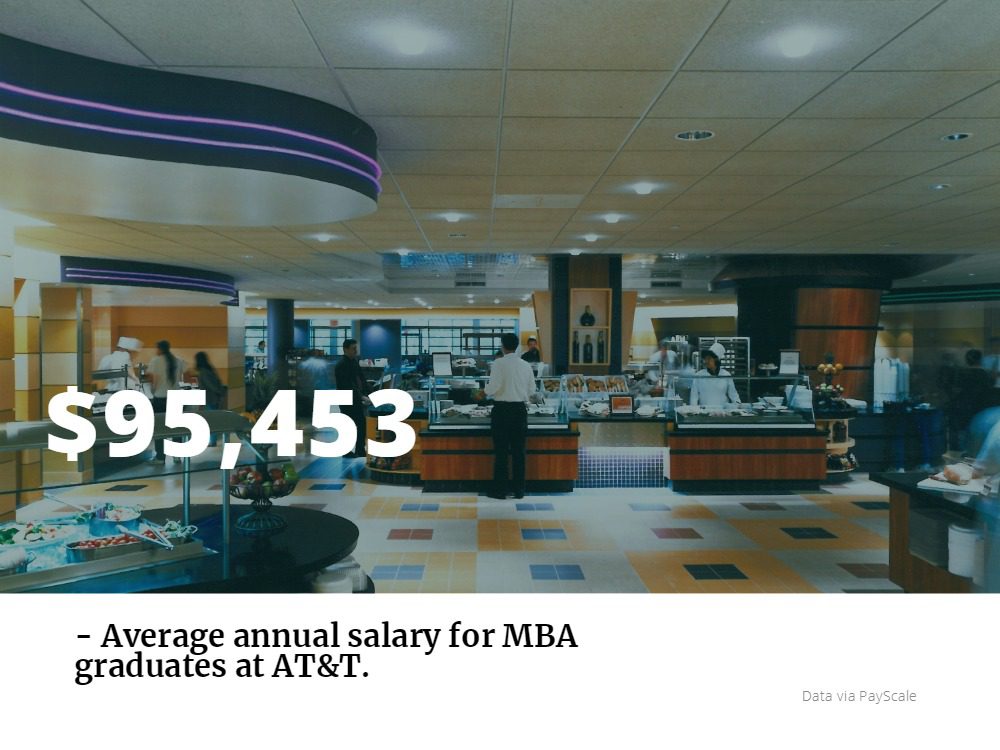Real Humans of the Rutgers Business School

When considering earning an MBA, a few priorities tend to stick out. Cost, career opportunities, flexibility, and educational value are all obvious sticking points. However, another crucial feature should matter more when it comes time to decide where you’ll go: return on investment.
The Rutgers Business School in New Brunswick and Newark, New Jersey, isn’t just the premiere MBA option in the Garden State (ranked 44th overall by U.S. News & World Report): it’s among the best return on investment opportunities you can find anywhere.

According to the Financial Times, which also ranks RBS among the best business schools in the world, the average salary jump for MBA grads is a staggering 112 percent. This return on investment figure bests some of the most recognizable programs in the world, including Dartmouth’s Tuck School of Business, the London Business School, and New York University’s Stern School of Business.
Part of the reason for such a pronounced ROI is, of course, the school’s ideal proximity to the New York City metro, offering students extensive opportunity advantages that other prestigious institutions struggle to compare to. Other provincial factors in the eye-popping ROI are the lauded areas of focus, including supply chain management (ranked 6th best in the country by U.S. News & World Report). When factored together, it may not be surprising to find a lot of diverse backgrounds studying at Rutgers Business School.
When talking with several current students, the litany of non-traditional students tends to stand out, including a radio DJ tired of an exhaustive industry, a theater vet, a former fifth grade music teacher looking to break out in an entirely new field, and more. Read on to see their stories and what the future may hold for life after an MBA.
U.S. Tops Highest MBA Salary Rankings

Return on investment post-MBA is one of the main considerations for candidates. After all, who would want to spend tens of thousands of dollars on an education without a solid salary afterward? That’s why it’s so important to look at how the best MBA programs can affect a graduate’s salary.
So, where should you go to school for your MBA if you want the best salary after graduating? We’re taking a look at the highest earning MBA programs per country to dig down into what you can earn as an MBA all over the world.
Northwestern Kellogg & HKUST Lead the 2018 FT EMBA Rankings

Where should you go to school for your Executive MBA? Good question. While, the answer may not be quite so simple, an official EMBA ranking can help.
There are many things you should consider before choosing the best EMBA program for you including average graduation salary, industry employment, research interests, and more. However, a good place to start is with the 18th edition of the Financial Times Global Executive MBA Ranking. This ranking collects key data from business schools and alumni around the world to come up with a list of the top 100 best programs worldwide.
We’ve collated some of the critical data from the ranking study to give you insight into what’s going on in the world of EMBA programs.
EMBA Graduates Choose Industry and Manufacturing
Compared to full-time MBAs, EMBA graduates are much more likely to work in certain industries like manufacturing. In fact, three times as many EMBAs are employed in industry or manufacturing compared to their full-time peers. The figure accounts for 17 percent of all graduates. In comparison, only 10 percent of EMBA graduates are in consulting roles. And they’re less likely to work in finance, too.
EMBAs Earn More Money
EMBA graduates can also expect to earn more money than full-time MBAs after graduation. The average salary for an EMBA is $220,000 whereas an MBA alumnus can expect to make $146,000. It’s a large gap that’s similar to the salary gap between an MBA and a MiM graduate ($146,000 VS $67,000). Keep in mind, however, that the typical Executive MBA student is significantly older and often has more work experience.
In contrast, full-time MBAs win when it comes to salary boosts before and after earning the degree. MBA alumni generally increase their salary by 107 percent while EMBAs only experience a 59 percent boost.
Top 10 EMBA Programs
This year, the top ten EMBA programs, according to the Financial TImes, includes four joint programs. In fact, these were the top four programs in the world ranking well for post-EMBA salary, alumni leadership positions, and work experience. Each of these programs offer excellent networking opportunities thanks to different cohorts across different campuses, connecting students around the world.
Here’s how all the rankings stacked up.
1. Northwestern Kellogg & HKUST
This joint program ranks first for the third year in a row, and it’s the ninth time in 12 years that it has headed the list—the other three times it ranked second. The program is known for having the highest average salary three years post-graduation, $507,000—$140,000 more than the second-highest salary. It’s also known for having half of its alumni as company leaders three years post-graduation.

No EMBA has dominated the annual FT ranking quite like the Northwestern Kellogg & HKUST join program, earning top billing once again for 2018.
2. HEC Paris, LSE, & NYU Stern
This trium global EMBA program ranks second in 2018, up from fifth the previous year. The program is ranked first in work experience, languages, and international course experience rank. It also ranks highly in average salary ($347,970) with an expected 60 percent salary increase three years post-EMBA.
3. Tsinghua University & INSEAD
For the second year in a row, the Tsinghua-INSEAD dual degree MBA comes in third overall on the FT EMBA ranking. Located in China, Singapore, France, and the UAE, the program is known for its high salary three years post graduation ($365,746), and its high percentage of female students (45 percent).
The rest of the top ten shakes down as follows:
- EMBA—Global Asia: Columbia Business School, HKU, & London Business School
- Ceibs
- HEC Paris
- Washington University Olin Business School
- Shanghai: Jiao Tong University Antai
- IESE Business School
- MIT Sloan School of Management
Surprising Schools
There were quite a few surprises in this year’s EMBA ranking.
- Though HEC Paris has ranked in the top five since 2006 because of its joint program with NYU Stern and LSE, this was the first year the school entered the top ten ranking on its own. The HEC Paris solo EMBA program ranks sixth overall, making it the highest new entrant.
- IESE Business School took home the crown as the top EMBA program for the new criterion corporate social responsibility (CSR).
- The University of Toronto Rotman School of Management EMBA moved up the most places in 2018, rising to 47th place overall—20 places higher.

No school saw a bigger rankings jump than the University of Toronto Rotman School of Management, rising 20 spots in 2018.
FT EMBA Ranking Methodology
To come up with the 2018 EMBA ranking, the Financial Times reached out to a record 139 programs with two online surveys: the first completed by the school and the second by alumni who graduated from programs in 2014. The methodology of the ranking is as follows:
- Alumni were required to provide feedback on salary today, salary increase, career progress, work experience, and aims achieved—accounting for 55 percent of the ranking’s weight.
- Schools provided insight into ten criteria, accounting for 35 percent of the total ranking. Criteria included: gender and international diversity, board members, international program reach, and more.
- Accounting for the final 10 percent of the ranking was the FT research rank, which looks at the number of articles published by a school’s full-time faculty.
And, for the first time ever, this year’s EMBA ranking included a new criterion for corporate social responsibility (CSR). This new criterion took a look at how many of a school’s core courses were dedicated to ethics, social, and environmental issues. Weighting at 3 percent, this criteria replaced the number of Ph.D. graduates per school.
Chicago Booth, Northwestern Kellogg Top Economist 2018 Rankings

The newest Economist best MBA rankings for full-time programs is officially out, with two Chicago schools topping the list.
Lehigh’s Online MBA Earns Top Ranking Honors

Sponsored Content
Lehigh moved into Poets&Quants‘ top 5 online MBA programs in 2019. Up one spot from 2018, Lehigh ranks No. 5 out of 35 programs in the country.
In the news website Poets&Quants‘ second annual ranking of online MBA programs, other graduate schools and recent graduates from the past two years were surveyed. Rankings are based on three key aspects: the quality of the incoming student, an assessment by graduates of their MBA experience, both the academic and the extracurricular activities, and the career outcomes of the programs’ graduates.
Graduates surveyed answered questions regarding consulting projects and international immersions and whether their career goals were met for entering the program.
The Lehigh FLEX MBA Program provides the flexibility to fit professional and personal needs in an academically rigorous environment, with an unparalleled peer group. Students can attend classes in person or live online, or bridge both modes.
For the Spring 2019 entering class, apply by Dec. 1 for admission.
To learn more about the synchronous Lehigh FLEX MBA online program, visit https://cbe.lehigh.edu/academics/graduate/flex-mba or contact the college at business@lehigh.edu.
To learn more about the Lehigh University College of Business and Economics Online MBA, you can visit the official Lehigh University College of Business and Economics website.
Top MBA Recruiters: AT&T

Finding employment after graduating from an MBA program can be a challenge for some. Thankfully, new MBAs are never alone in the process. From companies that actively recruit talent from business schools throughout the country, to MBA programs themselves helping to facilitate interviews and job referrals for their students, students should be sure to take advantage of resources available to them.
A look at 2017 employment data from a top MBA program like the University of Chicago’s Booth School of Business reveals the overwhelming trend: a whopping 89.2 percent of students found employment through university-facilitated avenues, be it on-campus recruitment and interviews, networking events, or through a Booth-facilitated summer employer. The success of campus recruitment benefits everyone, not only because universities are willing to open their doors and advocate for their students, but because top companies go out of their way to recruit young talent and create opportunities for them.
One such company is American multinational telecommunications holding company, AT&T. Founded in 1983 as the Southwestern Bell Telephone Company—part of the Bell Telephone Company with roots in the late 19th century—today AT&T has more than 254,000 employees worldwide and $190 billion in revenue. With a commitment to MBA graduates through internships and early career development programs, AT&T makes the grade as a top recruiter and employment destination for MBAs.
What Is An AT&T Career Like for MBAs?
It should be no surprise that MBAs love working at AT&T when you know the kind of investment this company makes in the educational development of its employees. In 2016, AT&T spent $250 million on employee training and invested roughly 20 million hours into the process. With so many opportunities for ambitious team members to accelerate their careers through leadership and development programs, this is the perfect company for those looking to quickly rise into leadership roles.
AT&T has been awarded many times for its workplace culture, including being named on Fortune‘s ‘100 Best Companies to Work for in 2018‘ and 3rd overall on the Diversity Inc. list of the ‘Top 50 Companies for Diversity‘ in 2018.
Of course, it pays to have an AT&T career, even beyond a positive workplace culture. According to PayScale data, MBA graduates at AT&T earn an average annual salary over $95,000. This can range as high as $142,000 for those in operations management. Employees, including interns, are rewarded with competitive compensation and benefits, including paid holidays, time off, and discounts for AT&T products.

Getting Started
MBA students interested in starting an AT&T career should keep an eye out for the various recruitment events set up through their university, where they can apply on campus and may be selected to interview with college recruiting managers. Because of the company’s heavy investment in a diverse workforce, AT&T also has a strong presence at recruitment conferences like the Forté Foundation for female business leaders, Reaching Out MBA for LGBT candidates, and the National Black MBA Association (NBMBAA).
Many MBAs start their AT&T career through its many internship opportunities, which are found at locations throughout the country and typically last 10-12 weeks. AT&T offers these paid internships a huge variety of fields, such as data analytics, cybersecurity, entertainment group technology, software development, and leadership, among others.
In addition to internships, MBA graduates may apply for one of the many AT&T career development programs. These are full-time, paid rotational programs that may last anywhere from two to three years, providing hands-on experience, exposure and opportunity. Development programs at AT&T include:
- B2B Sales
- Cybersecurity Development
- Engineering and Operations Development
- Finance Leadership Development
- Leadership Development
- Software Development
What Does AT&T Look for in MBA Candidates?
When hiring for its MBA internships and development programs, AT&T looks for students with at least three years of professional experience with the ability to collaborate on complex issues and thrive in a leadership role. The company seeks candidates who are passionate about the role technology can play in people’s lives and its capacity to transform.
In addition to the internships and early career programs, AT&T also looks for more experienced MBA holders for higher-level executive and management positions. For these roles, the company seeks candidates with at least five to eight years in experience related to the role with the ability to work in a team, be a self-starter, and think critically.
